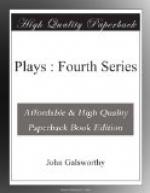Press. [Laying down-his note-book] I say, let me talk to you as man to man for a moment.
Lemmy. Orl right. Give it a rest!
Press. Your sentiments are familiar to me. I’ve got a friend on the Press who’s very keen on Christ and kindness; and wants to strangle the last king with the—hamstrings of the last priest.
Lemmy. [Greatly intrigued] Not ’arf! Does ’e?
Press. Yes. But have you thought it out? Because he hasn’t.
Lemmy. The difficulty is—where to stop.
Press. Where to begin.
Lemmy. Lawd! I could begin almost anywhere. Why, every month abaht, there’s a cove turns me aht of a job ’cos I daon’t do just wot ’e likes. They’d ’ave to go. I tell yer stryte—the Temple wants cleanin’ up.
Press. Ye-es. If I wrote what I thought, I should get the sack as quick as you. D’you say that justifies me in shedding the blood of my boss?
Lemmy. The yaller Press ’as got no blood—’as it? You shed their ile an’ vinegar—that’s wot you’ve got to do. Stryte—do yer believe in the noble mission o’ the Press?
Press. [Enigmatically] Mr. Lemmy, I’m a Pressman.
Lemmy. [Goggling] I see. Not much! [Gently jogging his mother’s elbow] Wyke up, old lydy!
[For Mrs. Lemmy
who has been sipping placidly at her port, is
nodding. The evening
has drawn in. Lemmy strikes a match on
his trousers and lights
a candle.]
Blood an’ kindness-that’s what’s wanted—’specially blood! The ‘istory o’ me an’ my family’ll show yer that. Tyke my bruver Fred —crushed by burycrats. Tyke Muvver ‘erself. Talk o’ the wrongs o’ the people! I tell yer the foundytions is rotten. [He empties the bottle into his mother’s mug] Daon’t mind the mud at the bottom, old lydy—it’s all strengthenin’! You tell the Press, Muvver. She can talk abaht the pawst.
Press. [Taking up his note-book, and becoming, again his professional self] Yes, Mrs. Lemmy? “Age and Youth—Past and Present—”
Mrs. L. Were yu talkin’ about Fred? [The port has warmed her veins, the colour in her eyes and cheeks has deepened] My son Fred was always a gude boy—never did nothin’ before ’e married. I can see Fred [She bends forward a little in her chair, looking straight before her] acomin’ in wi’ a pheasant ’e’d found—terrible ’e was at findin’ pheasants. When father died, an’ yu was cumin’, Bob, Fred ’e said to me: “Don’t yu never cry, Mother, I’ll look after ‘ee.” An’ so ’e did, till ‘e married that day six months an’ take to the drink in sower. ’E wasn’t never ‘the same boy again—not Fred. An’ now ’e’s in That. I can see poor Fred——
[She slowly wipes a
tear out of the corner of an eye with the
back of her finger.]




